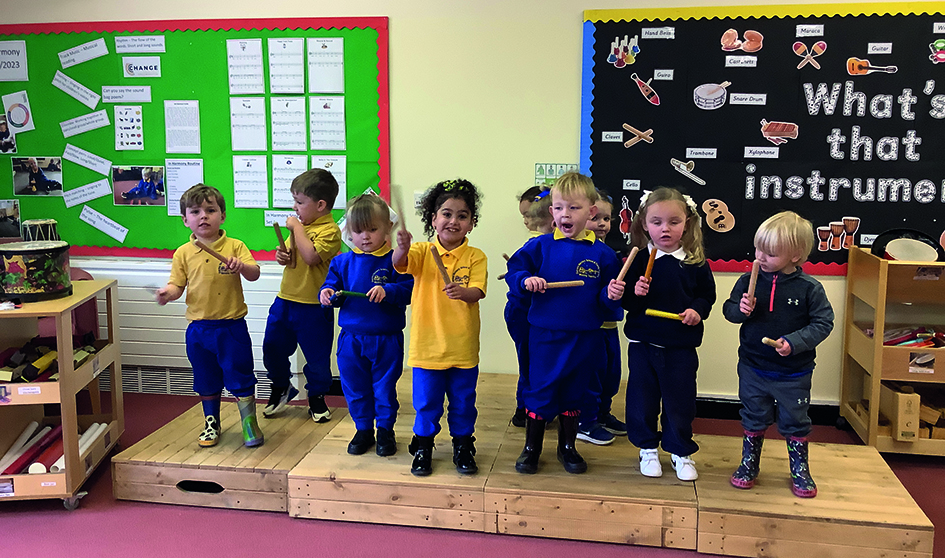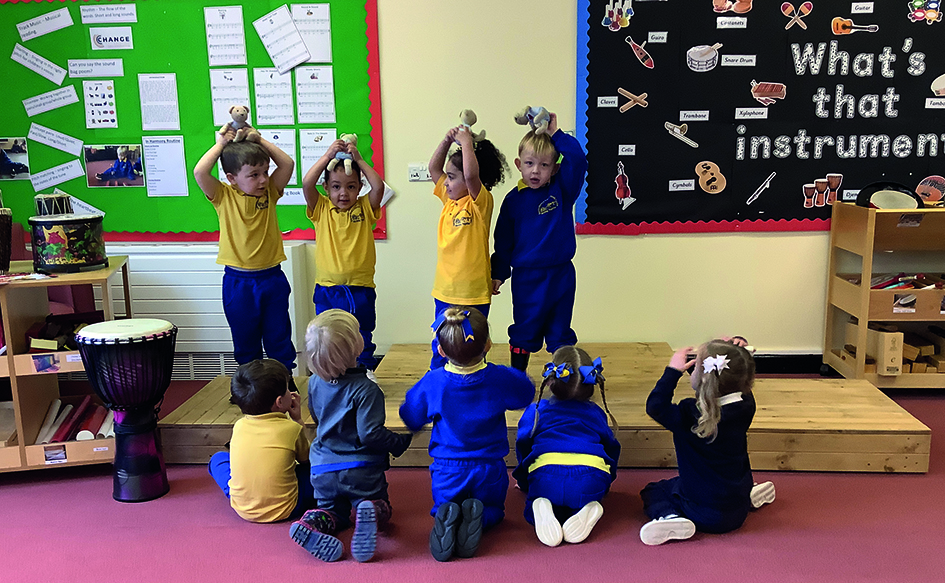
Liverpool is the second most deprived local authority in the country, where one in three children live in poverty. Children commonly start nursery at 36 months old, with levels of development up to 20 months below expectations for their age.
Everton Nursery School and Family Centre has worked with Cumbria and Oxford universities to take part in research projects that drive forward improvements in a range of areas, from early communication to physical development and creativity. We’re fascinated by research,’ says head teacher Dr Leslie Curtis OBE. ‘But it's about how it works for us, as educators, as leaders and the children. We don't want to put extra workload on everybody…it's got to be meaningful.’
LANGUAGE DEVELOPMENT
 Many of the projects Everton has engaged with are based on communication, which is a key area of focus for the nursery.
Many of the projects Everton has engaged with are based on communication, which is a key area of focus for the nursery.
Dr Curtis says a number of children entering the nursery with limited language has prompted staff to reflect, ‘What can we do as educators to try and enhance that language? Could we change anything in our practice?’ She adds, ‘We’ve developed it through a range of research-evidence-based programmes over the last five to ten years. We’ve used a lot of WellCom analysis (speech and language toolkits for screening and intervention) to analyse where our children are.’
One recent project was an Oxford University study looking at practitioners’ pedagogical knowledge of language and how this affects children's language outcomes, while a current Sutton Trust and SHINE project involves addressing early language and communication inequality by using the CECIL programme (Coaching Early Conversation Interaction and Language) to embed high-quality practice in EYFS settings.
One of the strategies taken from these projects has been using video footage to support staff's continuous professional development (CPD). A previous project used GoPro cameras so that practitioners could analyse both their own and the children's language. ‘We used footage to assess our own interactions and then as we got braver, we started to share our footage with a wider team,’ says Faye O’Connor, an assistant head teacher who also teaches at the nursery. ‘You learn a lot about your own practice.’
Another project, Creativity Collaboratives (see case study), saw sessions formerly led by musicians from the Royal Philharmonic Liverpool Orchestra adapted by the setting so they can be led in-house with expert input and help with curriculum design from the musicians. The move was due to children being less responsive to unfamiliar adults post-pandemic.
MANAGING RESEARCH
 One obvious challenge of embedding research projects in daily practice is time. Dr Curtis says, ‘Staff absences can have an impact on time to deliver on projects, so having backfill is really important.’ This ‘backfill’ involves extra funding to release a number of staff to engage with research projects and attend CPD sessions. O’Connor explains, ‘We always have a team – sometimes up to five members of staff – which means it's cascaded really quickly as there are more people who are trained and more staff knowledge. We all work really hard, but we’re not superheroes – we do need that shared practice.’
One obvious challenge of embedding research projects in daily practice is time. Dr Curtis says, ‘Staff absences can have an impact on time to deliver on projects, so having backfill is really important.’ This ‘backfill’ involves extra funding to release a number of staff to engage with research projects and attend CPD sessions. O’Connor explains, ‘We always have a team – sometimes up to five members of staff – which means it's cascaded really quickly as there are more people who are trained and more staff knowledge. We all work really hard, but we’re not superheroes – we do need that shared practice.’
Dr Curtis says staff must feel as if ‘they own the project and can see the benefits to themselves and to the children’. She adds, ‘That's not always articulated well, so leadership is really key to get that across to all of the staff involved.’
Having adequate funding in place for cover also mitigates stress, says Dr Curtis. ‘It takes the pressure off the room who are trying to provide high quality, and it takes the pressure off the person on the course, who doesn't feel guilty or worried.’
O’Connor adds that it can be ‘cognitive overload if you turn up somewhere a bit rushed and you know you’ve got to rush back again. It does impact the project itself and your ability to engage and internalise it all.’
When choosing research projects to take part in, Dr Curtis recommends considering how it fits in with the setting's plans and goals, but also consider the rationale of the research and the benefit to the setting. ‘It's about what you can invest time, energy and funding into so it makes high-quality professional development opportunities for your staff team, but at the same time, making sure the children get the best deal out of having somebody involved in a research project. We don't want to end up with a less qualified provision because you keep taking their adults away.’
Research-based CPD also has an impact on staff morale. ‘You do feel valued as a member of staff when that much time and effort is putinto you and your practice,’ says O’Connor. She says being involved in research projects has benefits over off-the-peg CPD that may not mention early years or feel like a good fit.
She adds, ‘People are maybe daunted by the term “research” if they consider it coming with a very academic background…but it's not always the case. You can undertakea lot of action research on a small scale that would really benefit your setting. There's an opportunity for everyone to take part in research.’
EVERTON NURSERY SCHOOL FACTS
- Established in 1932, Everton Nursery School and Family Centre now caters for 157 children aged two to five.
- Became first integrated centre for the city of Liverpool, with staff recruited from both social services and education, in 1998.
- Has received five consecutive ratings of Outstanding from Ofsted and won several awards.
- Is a strategic partner for the Inspire learning teaching school hub, disseminating their work with practitioners across Liverpool and the Wirral.
- Involved in developing an early years leadership NPQ-EYL qualification.
CASE STUDY: playing with an orchestra
Musicians from the Royal Philharmonic Liverpool Orchestra were already delivering ‘In Harmony’ musicianship sessions as part of the nursery's curriculum, but following the pandemic they noticed that some children were struggling to access and engage with the sessions. So the nursery decided to take part in the Creativity Collaboratives research project, focusing on developing creative habits in children.
‘Children respond better to the adults that they have secure and positive relationships with,’ says assistant head teacher Faye O’Connor. ‘The musicians have fantastic musicianship skills beyond what teachers have, they’re able to play violins, bassoons, cellos – but what they’re still developing is their skills in the early years.’
The nursery teachers have been trained by the musicians to transition to leading the music sessions themselves. ‘We’re creating a curriculum now that allows the teachers to teach those sessions, but brings in the musician to expose the children to that high-quality music experience and to play instruments,’ explains O’Connor. ‘Some staff were nervous at first, but that quality CPD really helped. We have a real safety net from the music team. They’ve given us a great curriculum we can adapt and link to children's interests.’
A concert for parents was a turning point. ‘They were the best concerts children had performed in about ten years, which I believe was because they felt more confident and safer with the teacher. Once staff saw the excitement in the children and the parents, [they] realised the impact they’d been having and the confidence they’d given the children.’
Twenty-five children are involved in the research, and levels of wellbeing and engagement will be monitored throughout the project to measure its impact. One of the benefits they have already noticed is that music has become more integrated across the nursery. ‘They practise these songs throughout the day instead of just once a week, because they're embedded in our curriculum,’ says O'Connor.
Another element of the project looks at the pedagogy related to children having an authentic audience when they engage in singing and music activities. Children of different ages have been taking on the roles of ‘performer’ and ‘audience’. Differences in their engagement are being explored through the use of staff questionnaires, student interviews and videos of performances with and without audiences.
FURTHER INFORMATION
- https://bit.ly/3ooBeyA
- The programme was developed in response to Durham University and Arts Council England's commission report which, following 18 months of research, concluded that teaching for creativity in schools must be prioritised to equip young people with the skills they need later in life.









